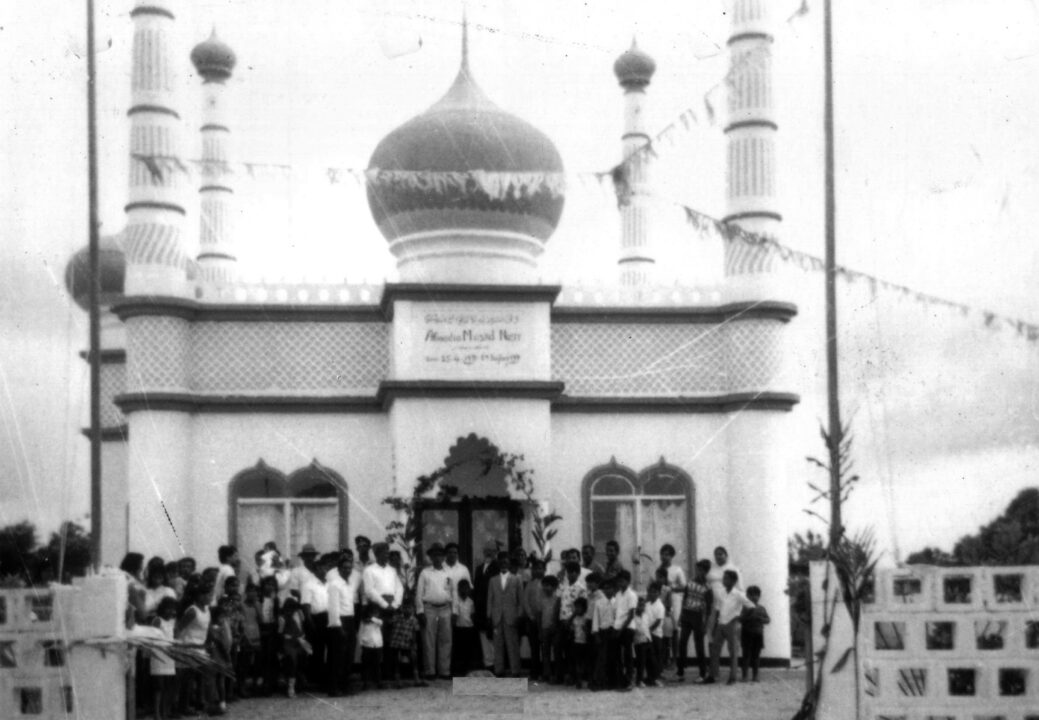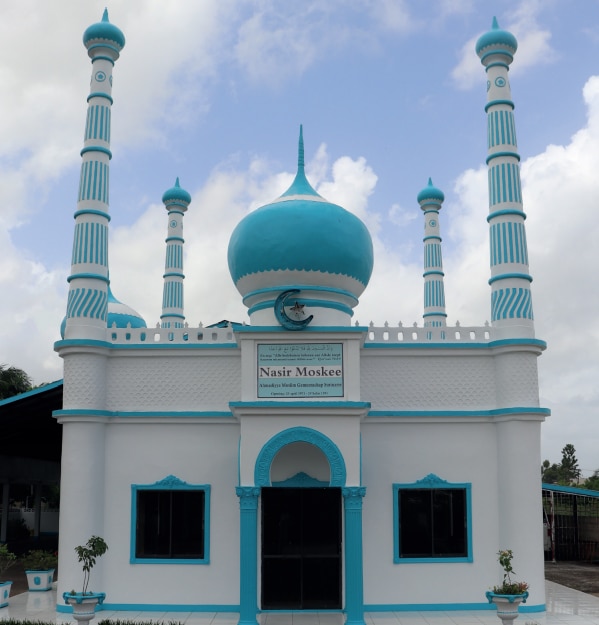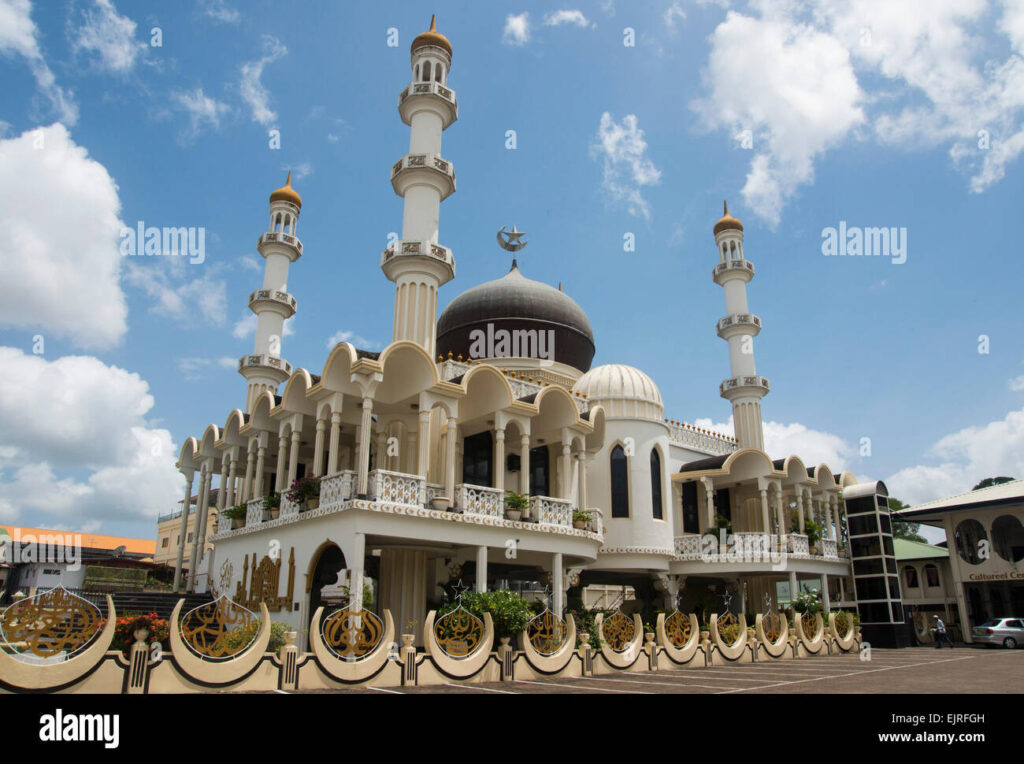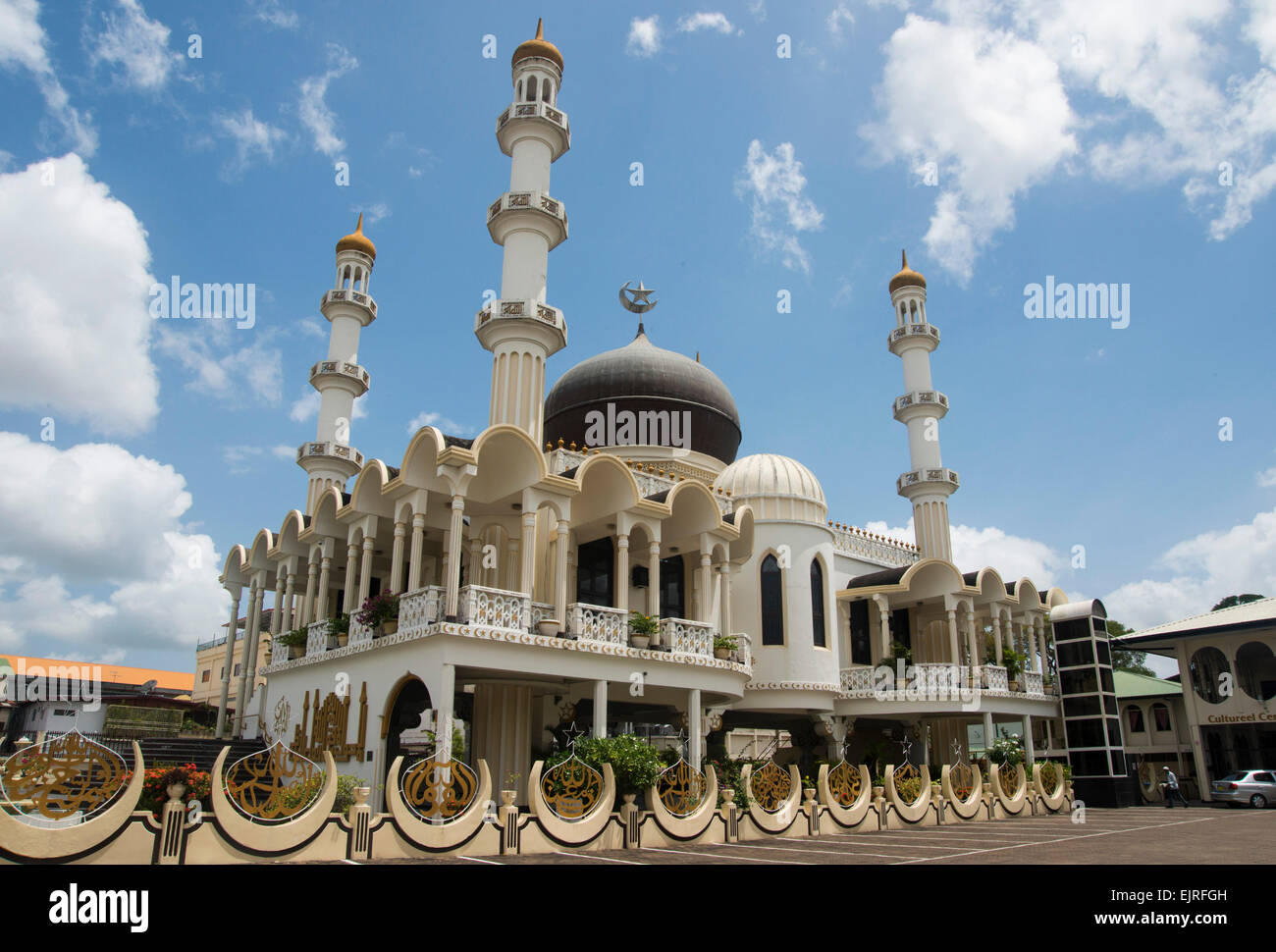Have you ever wondered about the historical richness of the Surinamese mosques? Well, get ready to be intrigued because we are about to delve into the fascinating history of these beautiful religious structures. In this article, you will learn about the origins, architectural styles, and cultural significance of the Surinamese mosques.
Let’s start with the origins. The Surinamese mosques have a diverse history that dates back to the colonial era. Suriname, a country located on the northeastern coast of South America, was once a Dutch colony known as Dutch Guiana. During the 18th and 19th centuries, Dutch Guiana saw an influx of indentured laborers from various parts of the world, including India, Indonesia, and West Africa. These laborers brought with them their unique religious practices, including Islam. As a result, mosques began to be established in Suriname, becoming an integral part of the country’s religious and cultural landscape.
Now, let’s talk about the architectural styles of the Surinamese mosques. One of the most striking features of these mosques is their blend of different architectural influences. The mosques in Suriname exhibit a mix of Moorish, Javanese, and Afro-Surinamese architectural styles, creating a unique fusion of aesthetics. The minarets, domes, and ornate doorways reflect the Moorish influence, while the use of wood and intricate carvings showcase the Javanese and Afro-Surinamese heritage. This blending of styles not only makes the Surinamese mosques visually stunning but also serves as a testament to the rich cultural diversity of Suriname.
In conclusion, the Surinamese mosques are not only places of worship but also treasures that hold a significant historical and cultural value. Their origins dating back to the colonial era, the blend of architectural styles, and the diverse cultural influences all contribute to their historical richness. So, if you want to learn more about the Surinamese mosques and their captivating history, keep reading and prepare to be amazed!

History of the Surinamese Mosque
The Surinamese Mosque holds a significant place in the history and culture of Suriname. It represents the long-standing Islamic presence in the country and showcases the rich heritage of Surinamese Muslims. The mosque’s origins date back to the period when Suriname was a Dutch colony and served as a hub for the transatlantic slave trade.
Origins of the Surinamese Mosque
The establishment of the Surinamese Mosque can be traced back to the arrival of Muslim slaves from West Africa and Indonesia in the 18th and 19th centuries. These individuals brought with them their Islamic faith, which became an integral part of their identity and culture.
Despite enduring the hardships of slavery, these Muslims managed to preserve their religion and tradition. They secretly practiced their faith, holding clandestine religious gatherings in their living quarters. The need for a communal worship space led to the construction of the first Surinamese Mosque.
Influence of Islamic Culture in Suriname
The Surinamese Mosque played a crucial role in spreading Islamic culture and practices in Suriname. The mosque served as a center for Islamic education, where Surinamese Muslims learned about their faith, prayer, and the teachings of the Quran. It provided a platform for the preservation and transmission of Islamic traditions to future generations.
Islamic culture permeated various aspects of Surinamese society, including language, cuisine, music, and clothing. Many Surinamese Muslims continued to speak Arabic and Indonesian dialects, ensuring the preservation of their cultural heritage. Traditional Islamic clothing, such as the hijab for women and the kufi for men, became common in Surinamese communities.
Architectural Features of the Surinamese Mosque
The design and layout of the Surinamese Mosque exhibit a unique blend of Islamic and local architectural influences. These architectural features reflect the cultural diversity and historical significance of Surinamese mosques.
Design and Layout of the Surinamese Mosque
Surinamese Mosques often feature a combination of traditional Islamic architectural elements and local Surinamese design aesthetics. The mosques typically consist of a central prayer hall, a minaret, and a courtyard. The prayer hall is adorned with intricate geometric patterns and ornamental calligraphy.
The mosque’s facade often showcases elaborate decorative motifs, including arabesque designs, floral patterns, and engraved Quranic verses. The minaret, a distinctive feature of Islamic architecture, serves as a symbol of Islamic identity and provides a place for the call to prayer.
Decorative Elements in Surinamese Mosques
The interior of the Surinamese Mosque is adorned with decorative elements that highlight the beauty of Islamic art and craftsmanship. These include intricate tile work, stained glass windows, and hand-carved wooden screens.
Calligraphy, a prominent feature of Islamic art, is displayed throughout the mosque, with verses from the Quran and other religious texts adorning the walls. The delicate interplay of colors and patterns create a serene and visually captivating atmosphere that enhances the spiritual experience of worshippers.

Importance of the Surinamese Mosque in Surinamese Culture
The Surinamese Mosque holds immense importance in Surinamese culture, serving as a symbol of religious freedom, community cohesion, and cultural heritage. It plays a vital role in shaping the social fabric of Surinamese society.
Role of the Surinamese Mosque in the Community
The Surinamese Mosque is much more than a place of worship. It acts as a community center, offering various services and programs that cater to the needs of Surinamese Muslims. It serves as a gathering place for community events, social gatherings, and educational activities.
The mosque provides support for individuals and families, offering counseling services, financial assistance, and healthcare referrals. It also plays a crucial role in promoting interfaith dialogue and fostering relationships with other religious communities in Suriname.
Celebrations and Religious Observances at the Surinamese Mosque
Throughout the year, the Surinamese Mosque hosts a range of celebrations and religious observances that bring the community together. These include Eid al-Fitr and Eid al-Adha, two significant Islamic festivals that mark the end of Ramadan and commemorate the willingness of Prophet Ibrahim (Abraham) to sacrifice his son. The Surinamese Mosque becomes a hub of activity during these festive occasions, with prayers, feasts, and cultural performances.
The Surinamese Mosque also holds regular Friday sermons (Jumu’ah), where the congregation gathers to listen to religious teachings and engage in communal prayer. These gatherings foster a sense of unity and spiritual connection among Surinamese Muslims.
Spiritual Significance of the Surinamese Mosque
The Surinamese Mosque serves as a spiritual sanctuary for Surinamese Muslims, providing a space for prayer, reflection, and worship. It embodies the spiritual teachings and practices of Islam, fostering a deeper understanding and connection to the faith.
Practices and Rituals in Surinamese Mosques
Prayer holds a central place in the daily lives of Surinamese Muslims, and the Surinamese Mosque provides a sacred space for this act of devotion. The mosque’s prayer hall is meticulously designed, with separate areas designated for men and women. Worshippers gather five times a day, facing Mecca, to engage in prayer, recite the Quran, and seek spiritual solace.
In addition to daily prayers, the Surinamese Mosque also hosts weekly congregational prayers on Fridays, where the imam delivers sermons and leads the community in prayer. These rituals foster a sense of unity, spirituality, and guidance for Surinamese Muslims.
Islamic Beliefs and Teachings in Surinamese Mosques
The Surinamese Mosque is a sanctuary for learning and enlightenment. Islamic scholars and teachers impart knowledge about the Quran, Hadith (sayings and actions of the Prophet Muhammad), and Islamic jurisprudence. Surinamese Muslims attend classes and lectures at the mosque, deepening their understanding of Islamic beliefs and teachings.
The Surinamese Mosque also promotes values of compassion, kindness, and moral conduct, encouraging worshippers to lead virtuous lives in accordance with Islamic principles. These teachings are aimed at nurturing spiritual growth and fostering a strong sense of ethics within the Surinamese Muslim community.

Interfaith Relations and Collaboration
The Surinamese Mosque actively engages in interfaith dialogue and collaborative initiatives, promoting understanding and harmony between different religious communities in Suriname.
Surinamese Mosque and Interfaith Dialogue
The Surinamese Mosque serves as a platform for interfaith dialogue, facilitating conversations and exchanges between Surinamese Muslims and individuals from diverse religious backgrounds. Through these discussions, the mosque aims to build bridges of understanding, challenge stereotypes, and promote mutual respect.
The Surinamese Mosque hosts interfaith events, seminars, and dialogue sessions, inviting representatives from different faith communities to participate. These initiatives allow for the sharing of religious practices, beliefs, and cultural traditions, fostering a spirit of unity and cooperation.
Projects and Initiatives promoting Interfaith Understanding in Suriname
In addition to interfaith dialogue, the Surinamese Mosque collaborates with non-profit organizations and other religious institutions to promote social welfare and community development. The mosque actively participates in initiatives related to poverty alleviation, healthcare programs, educational projects, and disaster relief efforts.
Collaborative projects involving Surinamese mosques aim to address social issues and improve the lives of marginalized communities. These efforts contribute to a more inclusive and compassionate society, transcending religious boundaries.
Challenges Faced by the Surinamese Mosque
The Surinamese Mosque, like many other religious institutions, faces various challenges that impact its preservation, identity, and integration into Surinamese society.
Preservation of Historical Mosques in Suriname
One of the significant challenges faced by the Surinamese Mosque is the preservation and maintenance of historical mosques. Over time, some of these mosques have fallen into disrepair due to lack of funding and resources. Efforts are being made to preserve these historical landmarks, ensuring their architectural and cultural significance is safeguarded for future generations.
Integration and Identity Challenges for Surinamese Muslims
Surinamese Muslims have faced challenges in integrating into mainstream Surinamese society while maintaining their cultural and religious identity. Balancing their Surinamese identity with their Muslim faith can sometimes lead to conflicts and misunderstandings. However, Surinamese Muslims continue to contribute positively to Surinamese society, enriching it with their diverse perspectives and values.

Education and Scholarly Pursuits at the Surinamese Mosque
The Surinamese Mosque has played a vital role in the education and intellectual development of Surinamese Muslims. It has provided a space for Islamic schools and religious education, nurturing the intellectual growth of individuals and preserving Islamic scholarship.
Islamic Schools and Religious Education in Suriname
Surinamese mosques have established Islamic schools, also known as madrasas, where children and adults can receive religious education. These schools focus on teaching Arabic, Quranic studies, Islamic history, and theology. The Surinamese Mosque, through its educational institutions, instills a deep understanding and love for Islam among Surinamese Muslims.
Scholarly Contributions of Surinamese Muslim Scholars
Suriname has produced numerous renowned Muslim scholars who have made significant contributions to Islamic thought and scholarship. These scholars have penned books, articles, and research papers on various aspects of Islamic theology, law, and spirituality. Their scholarly pursuits have brought recognition to Suriname and have enriched the global Islamic intellectual tradition.
Inclusive Practices and Women’s Involvement
The Surinamese Mosque has made efforts to promote inclusivity and involve women in various aspects of mosque activities, recognizing the importance of gender equality in Islam.
Women’s Role in Surinamese Mosques
Surinamese mosques have recognized the significance of women’s participation in mosque activities. Women are encouraged to actively engage in prayers, attend religious classes, and take leadership roles within the mosque community. This inclusive approach allows women to contribute their insights, skills, and talents to the growth and development of Surinamese mosques.
Efforts towards Gender Equality and Inclusion in Surinamese Mosques
Surinamese mosques are working to address gender disparities within mosque spaces. The leadership of some mosques actively involves women in decision-making processes, allowing them to voice their concerns and contribute to the development of the mosque community. This commitment to gender equality is an indication of the evolving role of women within Surinamese mosques.

Art and Culture in Surinamese Mosques
Surinamese mosques are not only centers of worship but also hubs of artistic expression and cultural heritage. They showcase the interplay between Islamic and Surinamese artistic traditions.
Calligraphy and Mosque Art in Suriname
Calligraphy holds a prominent place in Surinamese mosques, with intricate Quranic verses and religious texts adorning the walls. Skilled calligraphers create visually captivating artworks that convey a spiritual message and celebrate the beauty of the written word.
In addition to calligraphy, Surinamese mosques feature traditional mosque art, including geometric patterns, floral motifs, and abstract designs. These art forms not only enhance the aesthetic appeal of Surinamese mosques but also serve as a visual representation of Islamic teachings and spirituality.
Traditional Music and Dance in Surinamese Mosques
Surinamese mosques are not only places of prayer but also venues for cultural celebrations. Traditional Surinamese music and dance performances are organized during festive occasions, showcasing the rich cultural heritage of Suriname. These performances often feature traditional Islamic music, such as Qawwali and Nasheeds, accompanied by percussion instruments.
Impact of Surinamese Mosque Architecture on Islamic Architecture
The Surinamese Mosque’s architectural designs have had a significant impact on global Islamic architecture, influencing the aesthetic and functional aspects of mosque construction.
Influence of Surinamese Mosque Designs on Global Islamic Architecture
Surinamese mosque designs have inspired architects and designers worldwide, shaping the development of contemporary Islamic architecture. The blend of Islamic and Surinamese architectural elements, such as intricate calligraphy, decorative motifs, and courtyards, has been emulated in mosques around the world.
The Surinamese Mosque’s emphasis on community integration and inclusivity has influenced mosque designs that prioritize communal spaces, education facilities, and social welfare amenities. This integration of cultural and religious elements in Surinamese mosque architecture has left an indelible mark on the global Islamic architectural landscape.
Exchange of Architectural Styles between Surinamese Mosques and Other Mosques
The architectural styles of Surinamese mosques have not only influenced global Islamic architecture but have also been influenced by various architectural traditions. The Surinamese Mosque’s structural features have been shaped by Dutch, Javanese, and West African architectural influences, creating a distinctively Surinamese aesthetic.
The exchange of architectural styles between Surinamese mosques and other mosques around the world has fostered a cross-cultural dialogue and enriched the diversity of Islamic architectural expressions.
Tourism and Cultural Heritage
Surinamese mosques have become tourist attractions, attracting visitors from various parts of the world who are eager to explore the rich cultural heritage of Suriname.
Tourist Attractions in Surinamese Mosques
Surinamese mosques, with their unique architectural designs and cultural significance, are popular tourist destinations. Visitors can admire the intricate craftsmanship, marvel at the decorative elements, and experience the serene atmosphere of Suriname’s mosques.
Guided tours are often available, providing visitors with insights into the history, cultural significance, and spiritual importance of these architectural gems. These tours allow tourists to appreciate the beauty and historical richness of Surinamese mosques.
Preservation of Surinamese Mosque Cultural Heritage
Efforts are being made to preserve the cultural heritage of Surinamese mosques, ensuring that future generations can appreciate their historical and architectural significance. The Surinamese government, along with local communities, invests in restoration and maintenance projects to protect and preserve these cultural treasures.
Efforts to document the history, stories, and significance of Surinamese mosques are also underway. Archival research, oral history interviews, and the compilation of historical records contribute to the preservation of the cultural heritage associated with Surinamese mosques.
Community Outreach and Social Welfare
Surinamese mosques actively engage in community outreach and social welfare initiatives, contributing to the welfare of Surinamese society and promoting a sense of social responsibility.
Charitable Activities and Initiatives by Surinamese Mosques
The Surinamese Mosque plays an active role in charitable activities, providing assistance to those in need within the Surinamese Muslim community and the wider society. These activities include distributing food and clothing to the less fortunate, organizing medical camps, and offering financial support for education.
Mosque-run charitable organizations collaborate with non-profit organizations to expand their reach and address social issues such as poverty, homelessness, and access to healthcare in Suriname. These initiatives reflect the humanitarian values of Islam and contribute to the well-being of Surinamese society.
Collaboration with Non-Profit Organizations in Suriname
Surinamese mosques collaborate with non-profit organizations in Suriname on various initiatives aimed at improving the lives of individuals and communities. Partnerships with organizations focused on education, healthcare, and poverty alleviation allow Surinamese mosques to extend their reach and maximize their impact.
These collaborative efforts foster a sense of social responsibility and facilitate the effective implementation of programs that address societal challenges faced by Suriname’s diverse population.
Role of the Surinamese Mosque in Surinamese History
The Surinamese Mosque has played a significant role in Surinamese history, serving as a symbol of perseverance, identity, and faith.
Surinamese Independence and the Surinamese Mosque
The Surinamese Mosque witnessed the struggle for independence and served as a gathering place for Surinamese Muslims during this historic period. Surinamese Muslims played an active role in the fight against colonial rule, and the Surinamese Mosque became a symbol of resistance and cultural identity.
The Surinamese Mosque represents the resilience and determination of Surinamese Muslims to maintain their faith and preserve their culture in the face of adversity.
Representation of Surinamese Muslim Identity through Mosques
Surinamese mosques are not only places of worship but also powerful symbols of Surinamese Muslim identity. As centers of community life, Surinamese mosques reflect the values, traditions, and aspirations of Surinamese Muslims.
Surinamese Muslims take pride in their mosques, considering them an integral part of their ancestral heritage and cultural identity. The Surinamese Mosque reinforces the importance of preserving their Islamic faith, cultural traditions, and historical legacy.
Conclusion
The Surinamese Mosque encapsulates the historical richness, architectural beauty, and cultural vibrancy of Suriname. It stands as a testament to the enduring faith and resilience of Surinamese Muslims, promoting interfaith dialogue, social welfare, and cultural heritage preservation.
The Surinamese Mosque is not just a physical structure but a living embodiment of Surinamese Muslim history, spirituality, and community. It continues to play a pivotal role in Surinamese society, fostering a sense of connection, unity, and pride among Surinamese Muslims.
